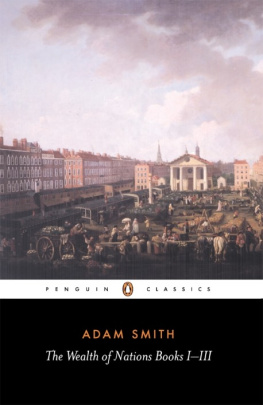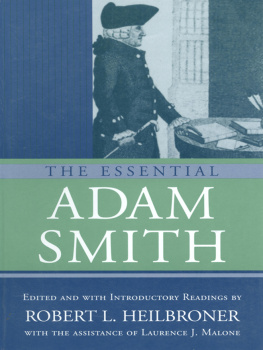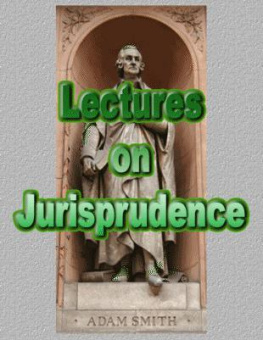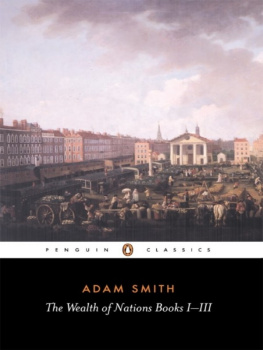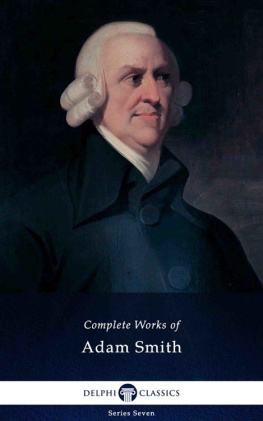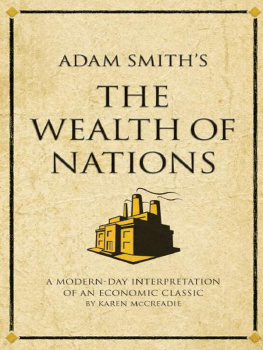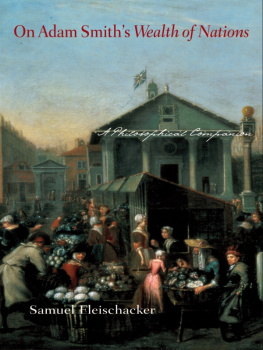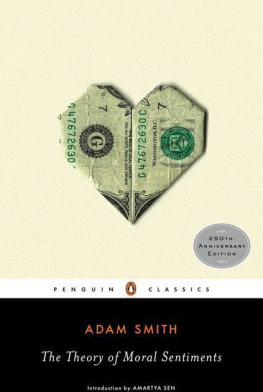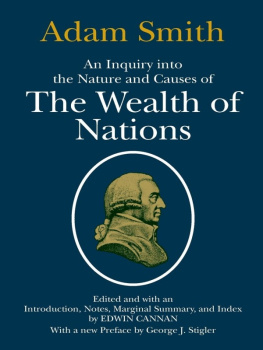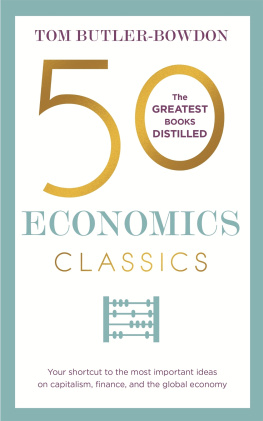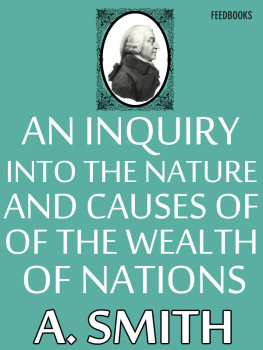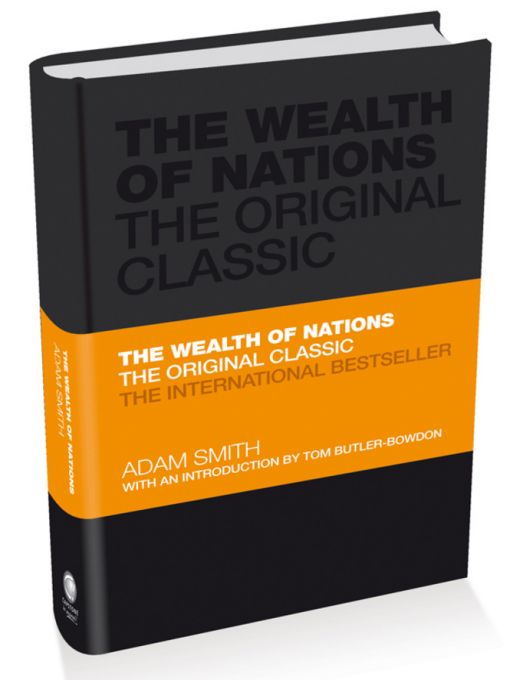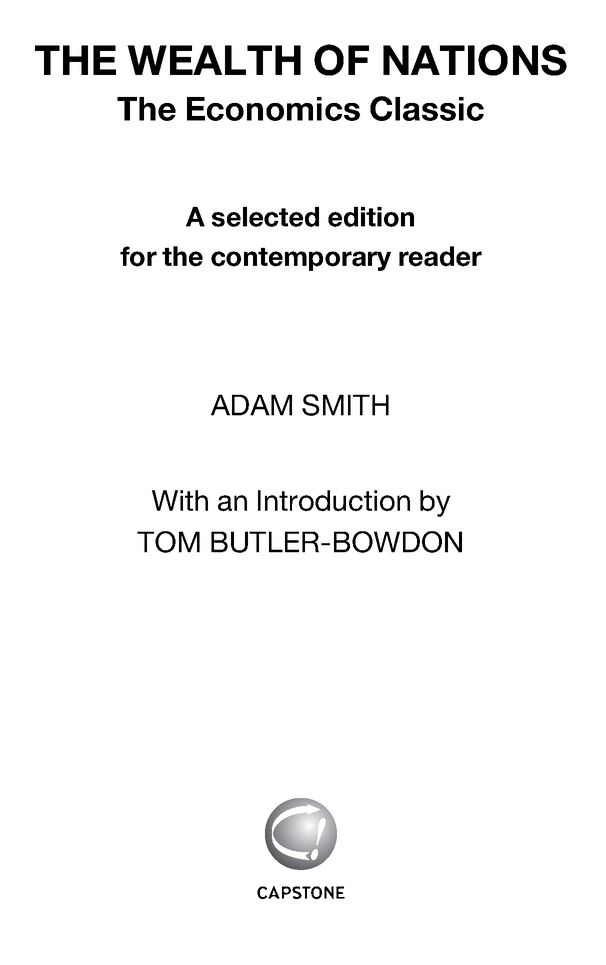Table of Contents
FOREWORD
THE WEALTH OF NATIONS is one of the most important and influential books ever written. It transformed how we think about the nature of economic life, turning it from an ancient to a recognizably modern form.
So much did Smith change our ideas that it is now hard even to describe the economic system that prevailed before his time. National wealth was measured in terms of a countrys stock of gold and silver. Trade was thought to benefit only the seller, not the buyer. One nation could get richer only if others got poorer. Imports were discouraged because these metals had to be shipped out to pay for them. Exports were favoured because they came back.
On these foundations, a vast edifice of controls was enacted to prevent the nations precious metals draining away - taxes on imports, subsidies to exporters and protection for home industries. Even Britains own American colonies were penalized under this system, with disastrous results. Indeed, all commerce was looked upon with suspicion, and the culture of protectionism pervaded the domestic economy too. Cities prevented artisans from other towns moving in to ply their trade; merchants petitioned the king for protective monopolies; labour-saving devices such as the new stocking-frame were banned as a threat to existing producers.
Smith showed that this edifice was built on a mistake, and that raising barriers against free trade left everyone poorer. In a free exchange, he explained, both sides become better off. Simply, neither side would trade if they lost by it. The buyer profits just as much as the seller. Imports are as valuable to us as our exports are to others. We do not need to impoverish others to enrich ourselves. Indeed, we have more to gain if our customers are wealthy.
Smiths breakthrough was to realize that because it benefits everyone, free exchange boosts our prosperity just as surely as agriculture and manufacture. A nations wealth is not the amount of gold in its vaults, but the volume of its production and commerce - what today we would call gross national product.
These novel but powerful ideas blew a large intellectual hole through the trade walls of Europe. And Smiths direct, challenging style, sardonic wit, and huge range of examples made them accessible to practical politicians, who translated them into action, creating the great 19th-century era of free markets, competition and prosperity.
Even today, the common sense of free trade is accepted throughout the world, whatever the practical difficulties of achieving it. Competition is now seen as obviously superior to monopoly. Gradually, the world economy is being opened to new nations, pulling billions of people out of abject poverty.
That last point would have given Smith particular pleasure. The Wealth of Nations is no defender of greed is good economics; the authors humanity and benevolence tint every page. He advocates free markets, limited government, personal freedom and the rule of law precisely because it is the poor, not the wealthy and powerful, who benefit most from them. It is a message that is just as relevant today.
Eamonn Butler
Director of the Adam Smith Institute
PREFACE
THE WEALTH OF NATIONS is simply the best book on political economy ever written. It is a genuine breakthrough book whose magisterial scope and synthesis have not been surpassed in the two-and-a-quarter centuries since it was written. Adam Smiths genius is not originality; rather it is to draw on a range of thought before him, seasoned with acute observation of history and the world around him, to come up with a sweeping synthesis of the economic system and its interrelated parts. He draws on preceding economic analysis (notably from the Physiocrats) - though, by modern academic standards, he is shockingly remiss in barely citing previous work. And he draws at least as much on his own Scottish-English tradition of moral philosophy, including his own Theory of Moral Sentiments.
The governing principle of the Smithian economic system is natural liberty (or non-intervention), which allows every man to pursue his own interest his own way, upon the liberal plan of equality, liberty and justice. And as Smith goes on to say, All systems of preference or restraint, therefore, being thus completely taken away, the obvious and simple system of natural liberty establishes itself of its own accord. Thus self interest (broadly conceived), if left to its own devices, conduces to the public good, particularly by maximizing the wealth of the nation.
The crucial qualification is that this is not a vision of anarcho-capitalism or unadulterated laisser faire. Rather it depends fundamentally on an appropriate framework of rules (justice in Smiths terminology), which the state is charged with instituting, updating and enforcing. Indeed, the role of government goes well beyond the minimal nightwatchman state of 19th and 20th-century caricature. Smith requires government to be strong in umpiring the Great Game of the market economy (as he calls it in The Theory of Moral Sentiments), and to provide what we now call public goods, including education for the poor. But - and this is where he differs from socialists and social democrats - it should remain limited by not trespassing on natural liberty (i. e. individuals economic freedom) and intervening in day-to-day market activities. That would mean taking sides and distorting the game in the wildly mistaken assumption that government has superior wisdom and knowledge to individuals themselves in the marketplace.
The Wealth of Nations ranges from a colourful exposition of the division of labour and the gains from specialization to psychological motives that govern market behaviour, the notion of value and price, the operation of capital and credit, the historical evolution of market society, all the way to the role of government in the economy. There is a core of theoretical economics that relates parts and functions of the economy to each other; but this is matched vividly to real-world history, policy and institutions, with plenty of illuminating and entertaining examples and anecdotes en route. Smith has his general rules and maxims, but his system is far from rigid and doctrinaire. Indeed, it is quite flexible in that it accommodates the imperfections of human nature (the coarse clay of which the bulk of mankind are formed, as Smith says) and is sensitive to political realities. The latter leads Smith to make several exceptions to his presumption of non-intervention, for example in advocating government restrictions on international trade when national security might be at risk (as defence is more important than opulence, he argues).
Smith extends this economic system animated by natural liberty from the domestic to the international sphere, from intra-national to international trade. Book IV of The Wealth of Nations lays out a comprehensive system of international trade, with a many-sided defence of free trade that remains unsurpassed. Smiths contemporary and close friend, David Hume has some brilliant sketches on international trade, but it is Smith who furnishes the overarching system.
Both Hume and Smith make a full-frontal attack on mercantilism as their point of departure. Both Scotsmen reserve some of their most vivid language to excoriate mercantilisms dog-eat-dog, zero-sum view of international trade. They dismiss mercantilisms central planks - the accumulation of bullion, import protection and export promotion, the trade surplus, the superiority of manufacturing to other forms of economic activity, and beggar-thy-neighbour international relations - as economic nonsense and political poison.


